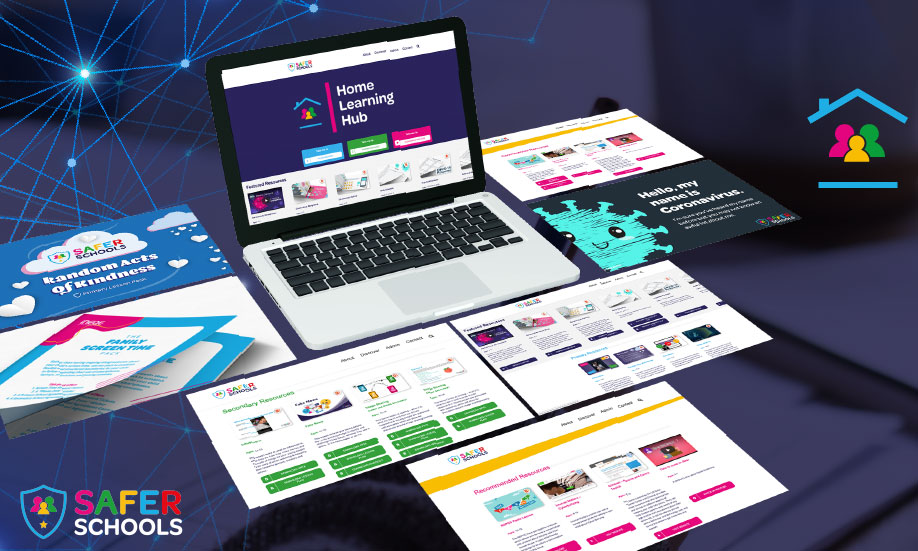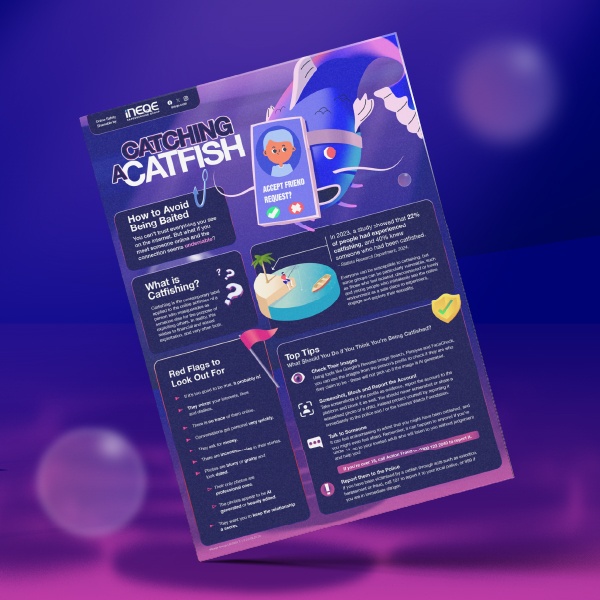Last Updated on 5th April 2024
Read the script below
Colin: Hello and welcome to Safeguarding Soundbites.
Natalie: This is the safeguarding news podcast that brings you all the past week’s online safeguarding news…
Colin: And advice. My name’s Colin.
Natalie: And I’m Natalie.
Colin: This week, we’re going to be talking TikTok advertising, how the Online Safety Bill could cause WhatsApp to leave the UK, and official health advice on children’s social media use.
Natalie, why don’t you kick us off this week by telling us what’s been happening in the world of social media?
Natalie: Sure! We’ll start with TikTok who have had a few issues around advertising on the platform this week. First, two posts advertising vapes have been banned. The ads were posted by two different influencers who were promoting particular brands of vapes.
Colin: What’s interesting is that we recently published an article about this – how social media can be a factor in influencing young people to vape.
Natalie: Yes, we did! Just a few weeks ago. And that’s because healthcare officials have warned that youth vaping is on the rise, despite it being illegal to sell vapes to under 18-year-olds.
Colin: It’s become a trend – and if young people are seeing people they admire or follow promoting vapes on social media platforms like TikTok, that’s actually just going to encourage that trend.
Natalie: Exactly. And nicotine is, of course, addictive but it’s also important to note that it’s particularly dangerous for children and young people. Some experts are saying it’s harmful to brain development for under 25’s. You mentioned our article, Colin, could you tell us a bit more about that?
Colin: Yes, so our listeners can find that on our website at ineqe.com in the Online Safety section. Essentially, it’s a full guide to everything parents, carers and teachers might want to know about youth vaping – what it is, why it’s harmful, why young people might vape and also some really great top tips in there, too.
Natalie: Great, thank you! So the other story that’s been in the news about advertising on TikTok is that a new report has come out on medical misinformation on the platform. A study presented at the Digestive Disease Week in Chicago this week showed that four in 10 posts about liver disease on TikTok contain misinformation.
Colin: That’s really high!
Natalie: It is! The most common misinformation was about how to heal liver disease – using herbal products, eating certain foods like beef liver or even doing parasite cleanses.
Colin: I don’t want to know what the last one involves!
Natalie: You really don’t!
Colin: But I suppose this speaks to a wider problem with misinformation across the internet and on social media sites like TikTok?
Natalie: It does. And this is something I think that parents, carers, teachers…anyone in a position of safeguarding needs to be aware of – that children and young people may be exposed to or even seek out medical advice and information on social media.
Colin: Actually, not too long ago, we reported in our Daily Safeguarding News, about young people turning to TikTok to search for advice more than Google.
Natalie: Yes. And even beyond social media, there have been reports of children and young people using AI like ChatGPT to find medical advice, in particular mental health advice.
Colin: In some cases, that might be because when they talk to someone, they’re worried about being judged, misunderstood or feel embarrassed. Turning to the internet for advice may feel more comfortable for a young person today and it’s not wrong to do so but it may be misleading outside of the context of conversation with an adult they trust.
Natalie: Which is why it’s so important to let the children and young people in our care know: a) who their trusted adults are…the adults in their life that they can go talk to when they’re feeling upset or worried about their health or anything. And b) that we open up those conversations ourselves and let them know it’s okay to talk about health, whether that’s mental health or physical health. It’s important that we reassure them, give them our full attention and try to remove any barriers to conversation that they might feel exist.
Colin: And just to add to that also, Natalie, that we talk about the importance of seeking professional medical advice from a doctor or a school nurse and that there is misleading and inaccurate medical information on social media.
Natalie: Yes, great point!
Colin: Okay, moving on to other social media news now and ministers have been warned that the messaging platform WhatsApp could leave the UK if the current form of the Online Safety Bill goes through.
Natalie: This is to do with end-to-end encryption, is that right, Colin?
Colin: Yes…so basically, end-to-end encryption is a system of communication used that keeps messages private between the sender and the person or people receiving that message.
Natalie: In other words, if I send you a message on WhatsApp, it’s just between you and I. No one else can access it?
Colin: Exactly. And that’s why it’s a bit of a hot topic – the Online Safety Bill is asking for tech companies to take responsibility for detecting content such as child sexual abuse material (also known as CSAM) on their platforms, but the tech giants say that breaking end-to-end encryption would breach the public’s human rights.
Natalie: So on the one hand, you have people and companies like WhatsApp who are concerned about end-to-end encryption and outside parties being able to access information sent between users…
Colin: And on the other, it’s this protection from third party access that many child safeguarding campaigners are worried actually protects predators because the law can’t see the content they are sending.
Natalie: Which means services like WhatsApp might leave the UK if the bill won’t explicitly promise to protect end-to-end encryption on platforms like theirs, as that’s one of their main features – that users’ messages are kept private.
Colin: Which has been a conversation this week in Parliament. Well, more of a row!
Natalie: A lively debate!
Colin: Yes, we’ll go with that! And WhatsApp have also been in the news after screenshots appeared showing the app’s microphone supposedly ‘listening in’ on devices. The screenshots showed notifications that the messaging app was attempting to access the microphone on Android devices during times when users would be asleep. However, WhatsApp have said the cause is a bug in Android systems, rather than a creepy attempt to listen to you snore! If you are worried, however, you can simply turn your microphone off in your phone’s privacy menu settings until WhatsApp announces an update to fix the problem…however I don’t think that’ll fix my snoring!
Natalie: In other news, official data has shown that the UK is the online child abuse capital of Europe, with police being passed over 300,000 online child abuse reports last year from the National Centre for Missing and Exploited Children. That’s an increase of 225% compared to the year before. The reason for increase in reports has been linked to both improved detection and reporting by tech companies but also a rise in online child abuse linking back to the Coronavirus pandemic, where many children spent extra time online that was often unsupervised.
Colin: Former head of child safety online policy at the NSPCC Andy Burrows says the worrying rise illustrates the need for the introduction of the Online Safety Bill as soon as possible. But it also, Natalie, reinforces the important need to educate and empower our children and young people with the knowledge of how to stay safer online.
Natalie: The American Psychological Association – or APA – have issued their first ever health advice on social media use by children. The report outlines how children and young people can be impacted by using online social networks.
Colin: Online social networks meaning social media?
Natalie: Essentially, yes.
Colin: Ah okay. So did the report say that social networks are harmful?
Natalie: Not outright – the APA said that online social networks are not inherently beneficial or harmful to young people but that they should be used with consideration. They recommended that parents and carers address children’s habits and routines on social media and remain vigilant to stop social media interrupting sleep routines and physical activity.
Colin: We’re all about healthy screentime routines here at Ineqe Safeguarding Group!
Natalie: We are! The APA also condemned social media algorithms that push young people towards harmful content.
Colin: For our listeners that aren’t sure, can you tell us more about social media algorithms?.
Natalie: Yes, for example, if I watch a TikTok video about beagle puppies, the algorithm will register that I might like to see more of this, and will show me similar videos. If I interact with these similar videos, the algorithm starts to recognise that I enjoy viewing this type of content and will continue to push this into my feed.
Colin: Well, we would all be happy if young people’s social media was filled with beagle puppies, but what happens if they watch something more harmful like self harm, eating disorder or suicidal ideation content?
Natalie: This is the problem. It means children and young people can end up caught in a loop of viewing harmful content on social media.
Colin: Although this was the American Psychological Association, the advice in the recommendations apply just as much here in the UK. What are some of the take home lessons from their recommendations?
Natalie: So as well as ensuring the child or young person in your care has healthy screen time habits, they also recommended limiting the time young people are spending comparing themselves to others, in particular around appearance and beauty related content.
They also suggested regularly screening for problematic social media use, looking out for addiction-type behaviours, such as spending more time on social media than intended or lying to get access to social media.
And to implement an age-appropriate level of monitoring through parental controls and – and this is really important but often adults find this difficult to do – for parents and carers to model healthy relationships with social media.
Colin: Yes, we definitely recommend that too!
Natalie: Finally, it’s time for our safeguarding success story of the week! Take it away, Colin !
Colin: Yes, our good news story this week is that a leader at a school in the UK who has run a student mentor programme for over 10 years has just released an explanation on how it works and why it’s so beneficial for school communities.
Natalie: It is so important for all students to feel safe and happy in school, and to feel they are able to share any concerns or problems they have with someone who will listen to them. Especially as the thresholds for referring a student to an external agency like Child and Adolescent Mental Health Services, or CAMHS, get harder to meet.
Colin: Exactly. Teachers and school staff work hard to create safe learning environments, but not every young person will want to speak to them about their struggles.
Natalie: So how does this mentorship programme work?
Colin: This specific mentorship programme sees students themselves take on the role of mentor. Students in older years are paired with younger children. The leader who instated this programme says they have been running this at their own school for over 10 years, with between 60 to 70 older students stepping up as mentors.
Natalie: Wow, that’s so inspiring!
Colin: Isn’t it? The leader stressed that it was important the mentoring scheme was ‘open’ to ensure all students could put themselves forward as mentors, rather than that task only be available to students who were highly successful in academics or sports.
Natalie: That makes sense! Just because someone isn’t a ‘model’ student doesn’t mean they won’t be a good mentor.
Colin: Precisely. They actually found that senior students who had struggled themselves could be far more helpful to talk to and easier to identify with for children who were also struggling. All students who put themselves forward to be a mentor are then provided with training, both from internal school sources like a counsellor, or an external organisation that is known for its training in active listening, letting others speak freely, and growth mindset through building resilience.
Natalie: Training that would help a student understand when an issue needs further help from a counsellor or another professional.
Colin: Yes, exactly. All of the meetings also happen with the school’s knowledge and agreement, and the school regularly checks in with the student mentors to see how things are going. This process creates a culture that helps everyone know they are supported and cared for, no matter what age or stage they are at. And every year, the leader said they had more students wanting to be mentors than they had students needing a mentor! Talk about a show of success.
Natalie: I love this so much! I wish I’d had this in place when I was at school.
Colin: You would make a great mentor, Natalie.
Natalie: Thanks Colin – so would you!
Well that’s all for this week – remember that you can keep up to date with us on our social media by following Ineqe Safeguarding Group.
Colin: And you can stay up to date with all things safeguarding by signing up to our safeguarding hub on our website ineqe.com or through one of our suite of safeguarding apps.
Natalie: Until next time…
Colin: Thanks for listening and remember as always, stay safe
Join our Online Safeguarding Hub Newsletter Network
Members of our network receive weekly updates on the trends, risks and threats to children and young people online.
Pause, Think
and Plan
Guidance on how to talk to the children in your care about online risks.

Visit the Home Learning Hub!
The Home Learning Hub is our free library of resources to support parents and carers who are taking the time to help their children be safer online.













